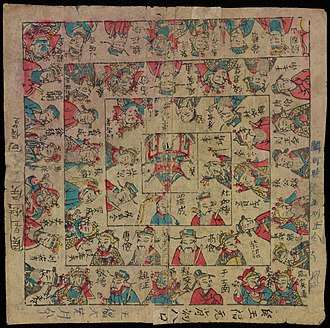Shi Danai
Shi Danai (史大奈), also known by his former name Ashina Danai (阿史那大奈), was a Turkic prince and the first foreigner to be a general in the Tang army. He was probably the eldest son of Chuluo Qaghan.

Career under Sui dynasty
Shi Dinai submitted to Chinese rule as early as reign of Emperor Yang of Sui in 611. He and his followers were granted Loufan County in the northern province of Shanxi.[1] He took part in the Goguryeo–Sui War from 612 to 614.
Career under Gaozu of Tang
He later joined Emperor Gaozu of Tang in his campaign against the Sui dynasty's region of Guanzhong in 617.[2] His 500-strong Turkic cavalry was instrumental in defeating Sui general Sang Xianhe (桑显和) during the Battle of Yinma Spring from an attack on his rear,[3] for which he was rewarded with the honorific title Grand Master for Splendid Happiness[4] (Chinese: 光祿大夫; pinyin: Guānglù Dàfū).[5] He was bestowed a Chinese surname Shi (史) after Li Yuan entered Chang'an same year. Following the establishment of the Tang dynasty, he participated in battles against Xue Ju, Wang Shichong, Dou Jiande and Liu Heita under the command of Emperor Taizong.
Later life
He retired in the early reign of Emperor Taizong and was appointed Right Wuwei General of the Tang army. He was also granted governorship of Fengzhou and named Duke Dou (竇国公) by Taizong with 300 people assigned to his household. He died in 638 and was buried in the Zhao Mausoleum.[6]
Family
He had two sons. Shi Renbiao (史仁表) married Princess Pu'an (普安公主), the eighth daughter of Taizong of Tang. The other was Shi Renji (史仁基).
In literature and media
- Text on his death stele was found in Dunhuang Manuscript S.2078, part of a student writing practice sample.[7]
- Shi Danai is a character in Tale of Tang (说唐), a Qing era novel.
- He was portrayed by Jiang Diwu in the Chinese TV series Heroes in Sui and Tang Dynasties (2003).
- He was portrayed by Zhao Qiusheng in the Chinese TV series Heroes of Sui and Tang Dynasties (2002).
References
- Pan, Yihong (1997). Son of Heaven and Heavenly Qaghan: Sui-Tang China and its Neighbors. Studies on East Asia. 20. East Asian Studies Press. p. 169. doi:10.25710/vs3m-gw59.
- Hung, Hing Ming (2013). Li Shi Min, Founding the Tang Dynasty: The Strategies that Made China the Greatest Empire in Asia. Algora Publishing. p. 32. ISBN 9780875869803.
- Connolly, Peter; Gillingham, John; Lazenby, John (2016-05-13). The Hutchinson Dictionary of Ancient and Medieval Warfare. Routledge. ISBN 9781135936815.
- Theobald, Ulrich. "Qing 卿, dafu 大夫, and shi 士 (www.chinaknowledge.de)". www.chinaknowledge.de. Retrieved 2019-10-26.
- New Book of Tang, vol 110
- Zhou, Xiuqin (April 2009). "Zhaoling: The Mausoleum of Emperor Tang Taizong" (PDF). Sino-Platonic Papers: 186.
- 朱振宏; Chu, Chen-hung (2015). "史大奈生平事蹟研究" [A Study of Shi Danai]. Journal of History of Taiwan Normal University (54): 1–44. doi:10.6243/BHR.2015.054.001 – via DSpace.